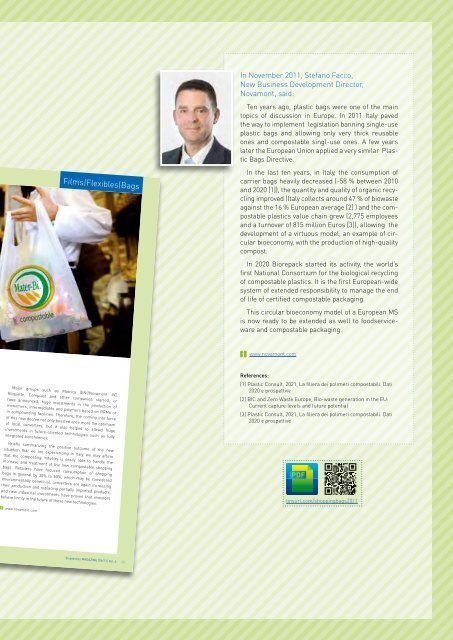Issue 06/2021
Highlights: Coating Films, Flexibles, Bags Basics: Cellulose based bioplastics
Highlights:
Coating
Films, Flexibles, Bags
Basics: Cellulose based bioplastics
You also want an ePaper? Increase the reach of your titles
YUMPU automatically turns print PDFs into web optimized ePapers that Google loves.
Automotive<br />
In November 2011, Stefano Facco,<br />
New Business Development Director,<br />
Novamont, said:<br />
Ten years ago, plastic bags were one of the main<br />
topics of discussion in Europe. In 2011 Italy paved<br />
the way to implement legislation banning single-use<br />
plastic bags and allowing only very thick reusable<br />
ones and compostable singl-use ones. A few years<br />
later the European Union applied a very similar Plastic<br />
Bags Directive.<br />
Films|Flexibles|Bags<br />
In the last ten years, in Italy, the consumption of<br />
carrier bags heavily decreased (-58 % between 2010<br />
and 2020 [1]), the quantity and quality of organic recycling<br />
improved (Italy collects around 47 % of biowaste<br />
against the 16 % European average [2] ) and the compostable<br />
plastics value chain grew (2,775 employees<br />
and a turnover of 815 million Euros [3]), allowing the<br />
development of a virtuous model, an example of circular<br />
bioeconomy, with the production of high-quality<br />
compost.<br />
In 2020 Biorepack started its activity, the world’s<br />
first National Consortium for the biological recycling<br />
of compostable plastics. It is the first European-wide<br />
system of extended responsibility to manage the end<br />
of life of certified compostable packaging.<br />
This circular bioeconomy model of a European MS<br />
is now ready to be extended as well to foodserviceware<br />
and compostable packaging.<br />
www.novamont.com<br />
Major groups such as Matrica (ENI/Novamont JV),<br />
Roquette, Cereplast and other companies started, or<br />
have announced, huge investments in the production of<br />
monomers, intermediates and polymers based on RRMs or<br />
in compounding facilities. Therefore, the coming into force<br />
of this new decree not only boosted once more the optimism<br />
of local converters, but it also helped to attract huge<br />
investments in future-oriented technologies such as fully<br />
integrated biorefineries.<br />
References:<br />
[1] Plastic Consult, <strong>2021</strong>, La filiera dei polimeri compostabili. Dati<br />
2020 e prospettive<br />
[2] BIC and Zero Waste Europe, Bio-waste generation in the EU:<br />
Current capture levels and future potential<br />
[3] Plastic Consult, <strong>2021</strong>, La filiera dei polimeri compostabili. Dati<br />
2020 e prospettive<br />
Briefly summarizing the positive outcome of the new<br />
situation that we are experiencing in Italy, we may affirm<br />
that the composting industry is easily able to handle the<br />
increase and treatment of the new compostable shopping<br />
bags. Retailers have reduced consumption of shopping<br />
bags in general by 30% to 50%, which may be considered<br />
environmentally beneficial, converters are again increasing<br />
their production and replacing partially imported products,<br />
and new industrial investments have proven that investors<br />
believe firmly in the future of these new technologies.<br />
tinyurl.com/shoppingbags2011<br />
www.novamont.com<br />
bioplastics MAGAZINE [<strong>06</strong>/11] Vol. 6 23

















